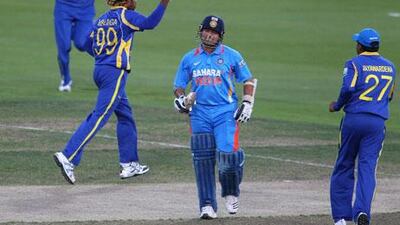SYDNEY // India left for home on Saturday after an abject tour of Australia to face recriminations after Sri Lanka ended their hopes of reaching the finals of the tri-series.
Sri Lanka held their nerve to end India's late bid for a spot in the best-of-three finals with a gripping nine-run win over Australia at Melbourne Cricket Ground on Friday.
That result means Sri Lanka will do battle with Australia in the finals, starting in Brisbane on Sunday.
India, who arrived Down Under in December as the second-ranked Test nation and reigning World Cup champions, return home to face questions over their poor tour, which included a 4-0 drubbing in the Test series against Australia.
As Cricinfo's Sidharth Monga observed: "In their own cocoon of denial, living in the past, out-batted, out-bowled, out-fielded, out-captained both on and off the field, out-coached, out-jibed by the hosts, India didn't really turn up."
Symptomatic of India's miserable time was the failure of batting star Sachin Tendulkar to claim his 100th international century.
Test and one-day cricket's revered leading run-scorer missed out on scoring a century for the first time in five tours to Australia, where he was given standing ovations to and from the wicket each time by respectful crowds. In eight Test and seven ODI innings Tendulkar could not deliver the ton that has eluded him since his 111 against South Africa at last year's World Cup.
India's tour record does not make for pretty reading.
Their 4-0 Test loss included defeat by 122 runs in Melbourne, innings losses in Sydney and Perth and a 298-run thrashing in Adelaide.
MS Dhoni's men set out to prove their doubters wrong in the triangular one-day series against Australia and Sri Lanka. After all, they were the reigning World Cup champions. Yet India again failed to measure up and despite an astonishing Hobart run-chase where they reeled in Sri Lanka's 320 with 80 balls to spare to give them late hope of squeezing into the finals, they ultimately missed out.
There have been calls back home for India's ageing batsmen - Rahul Dravid, VVS Laxman, even Tendulkar - to move on and questions over the strategy and approach of captain Dhoni and the batting lethargy of Virender Sehwag.
Former captain Sunil Gavaskar even questioned whether the Indian team was hurting enough from the crushing losses they endured.
Touring journalist Amol Karhadkar of the Hindustan Times observed on the final night in Brisbane that while cricket fans back home hoped for an Australian win over Sri Lanka, a number of players appeared little bothered. "While most of the players watched the first half of the match together in the team hotel, they ventured out for dinner later on," he said.
One unnamed Indian player told The Times of India newspaper: "A team [Sri Lanka] which knocks down Australia three times on the trot has to be in the final.
"On the positive side, we will get to spend a few days at home before going to Bangladesh for the Asia Cup. We have been away for almost three months and were feeling a bit homesick."
Presumably not as sick as Indian cricket fans feel about the past few months.

India cricket team return after a forgettable tour of Australia
MS Dhoni's men face media criticism as Australia meet Sri Lanka in tri-series final on Sunday.
Most popular today
